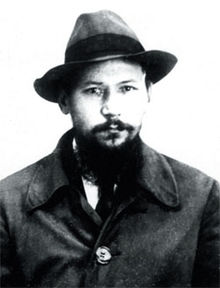- Vasily Yakovlev
-
Vasily Vasilyevich Yakovlev (1885-1938) was a Finnish old Bolshevik revolutionary and politician. He participated in the October Revolution of 1917; transferred former Russian Emperor Nicholas II and his family to Yekaterinburg, where they were later killed; rose to become a commander in the Red Army during the Russian Civil War; fled to China after being captured by the White Army, where he became a government advisor; and returned to the Soviet Union in 1928, where he was eventually arrested and executed.
Biography
Vasily Yakovlev was born Konstantin Alekseyevich Mâčin on August 17, 1885 (O.S.) to Aleksey Mâčin, a Latvian engineer. In 1901 he was recruited as a sailor and studied electrical engineering in Helsinki, where in 1905 he joined the Bolshevik faction of the Russian Social Democratic Labour Party and participated in an uprising of sailors. After being sentenced to death in absentia by a military court, he went into hiding under the name Vasily Vasilyevich Yakovlev.
He participated in many acts of sabotage and terrorism, including an armed train robbery through which he seized approximately 1.5 pounds of gold, which was invested into the Party. He managed to escape to Brussels, Belgium, where he worked as an electrician. He was active in Party causes there, and briefly lived in Canada and Germany. After the February Revolution of 1917, in March he returned to Russia through Stockholm. He was an active member of the Petrograd Soviet, of which he became a deputy commander and a military librarian.
During the October Revolution of 1917 he participated in the capture of the Winter Palace, after which he became the commissioner of the central telephone station of Petrograd, and was also a delegate at the Second All-Russian Congress of Soviets. In March 1918 he was appointed by the Central Executive Committee to oversee the transfer of former Russian Tsar Nicholas II and his family from Tobolsk to Omsk, where Nicholas was to be put on trial. The train departed on April 17 but due to the advancement of White Army soldiers loyal to Admiral Aleksandr Kolchak, who were blockading the railway as part of the ongoing civil war, orders from Moscow led to Yakovlev diverting the train to Yekaterinburg instead, where it arrived on April 30. On July 17 the family and four retainers were executed there.
Yakovlev returned to Moscow, where on May 15 he was appointed Commander-in-Chief of the Red Army's Ural Front, and in June Commander of the Army. He was captured and arrested by White forces in November—having been attempting to infiltrate them since October—but was released in 1919 and fled to Harbin, China where in 1921 he became an adviser to the republican government under the name Konstantin Alekseyevich Stoyanovich. He returned to Moscow in 1928, was immediately convicted of treason and imprisoned until 1933. He was released shortly after, but in 1938—during the Great Purge—was again convicted of treason, arrested, and executed on September 16.
Categories:- Bolsheviks
Wikimedia Foundation. 2010.

